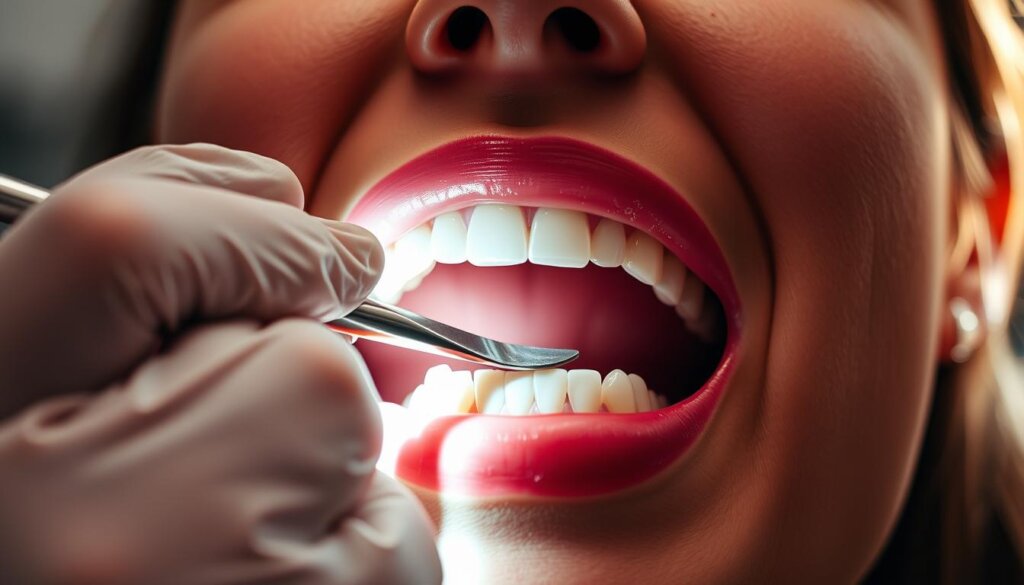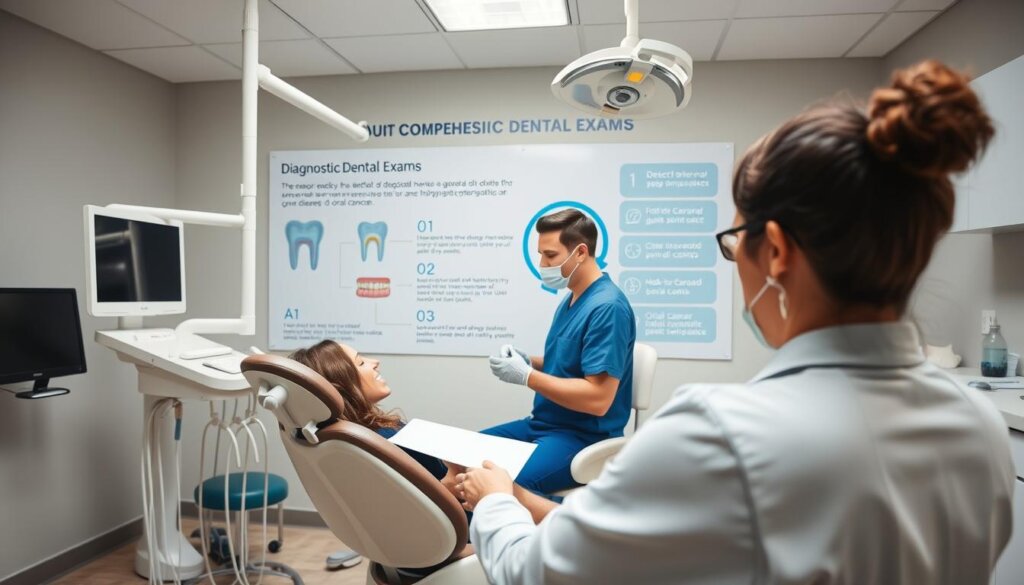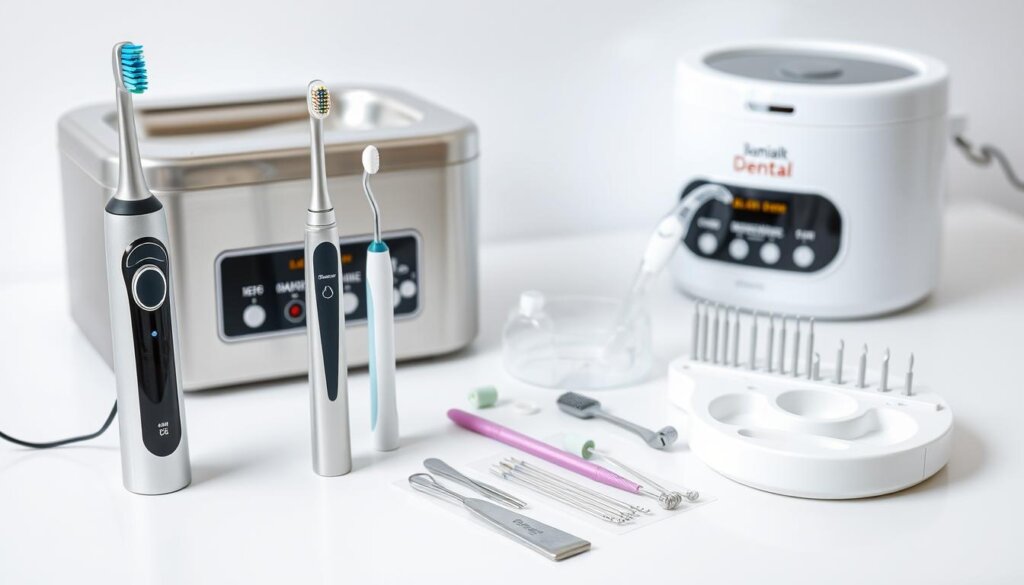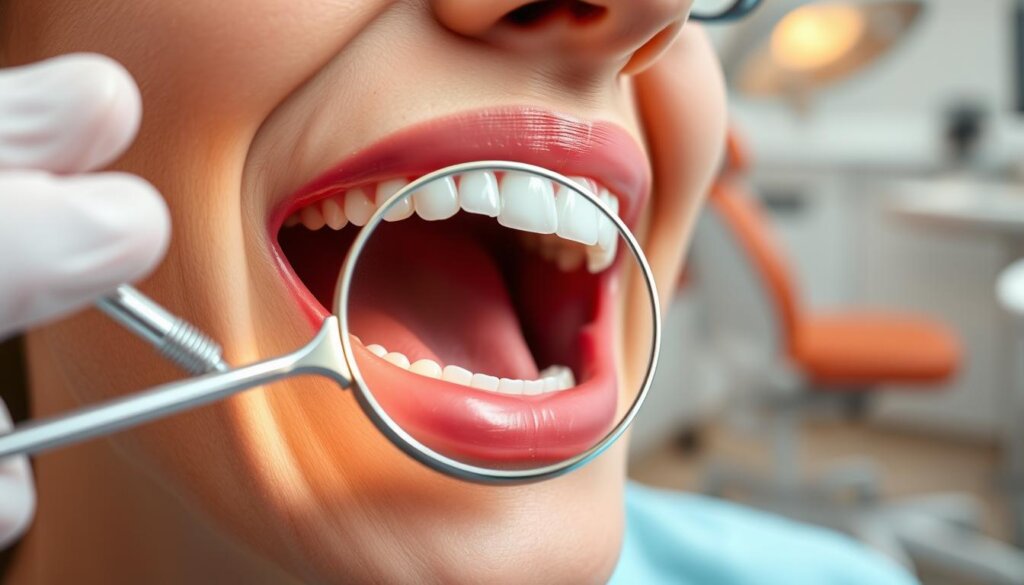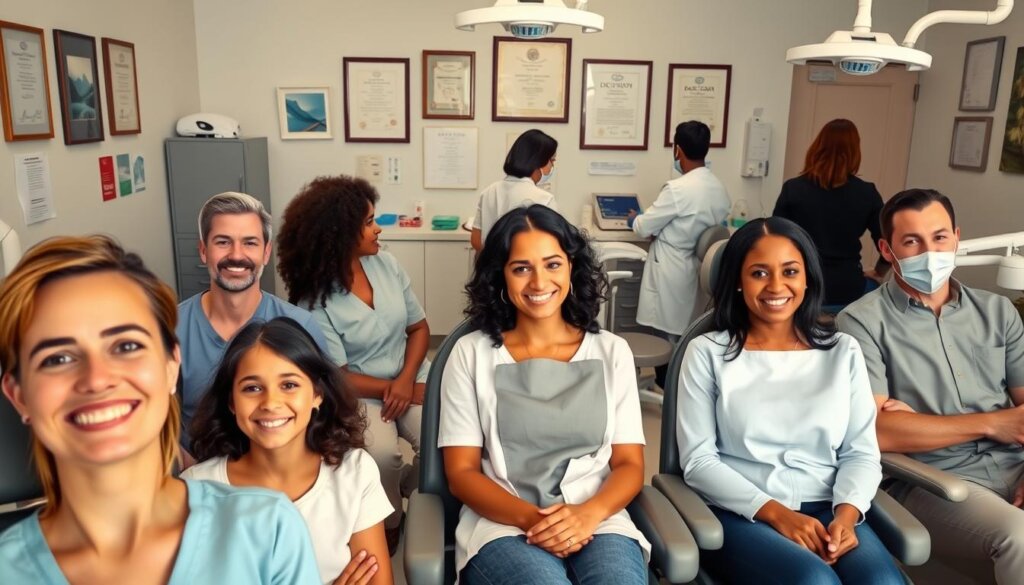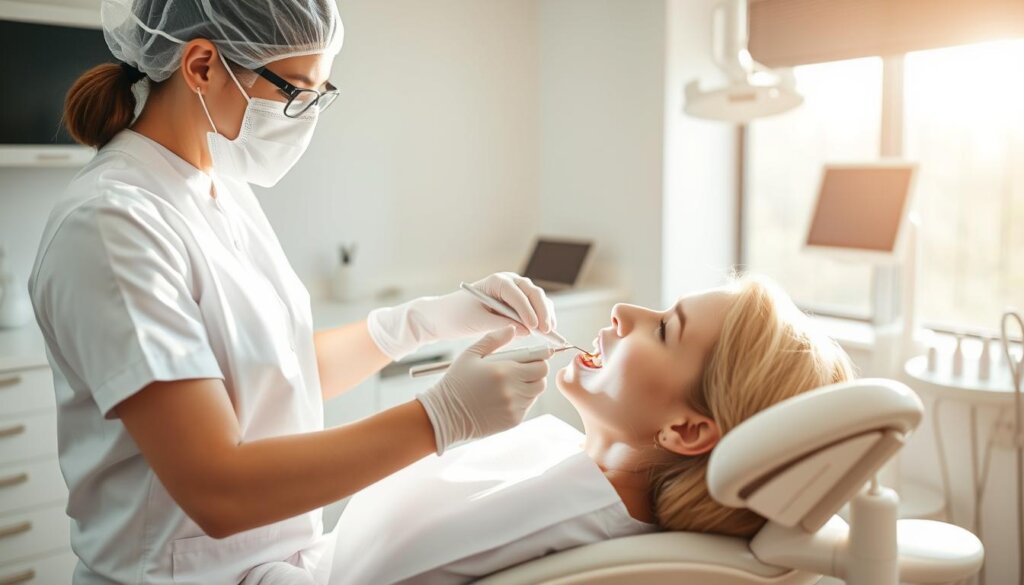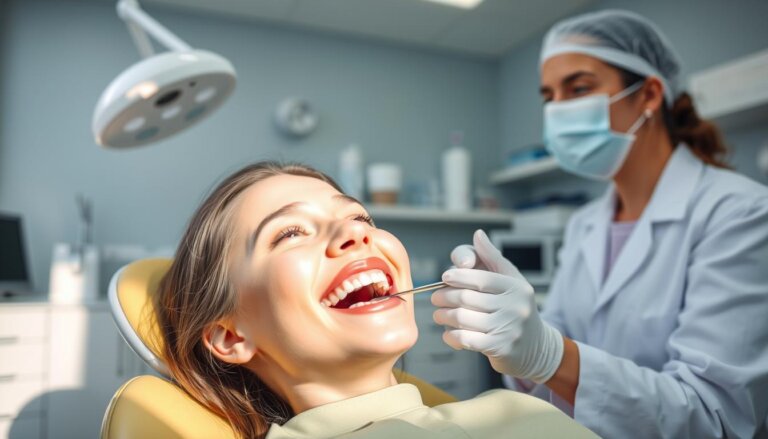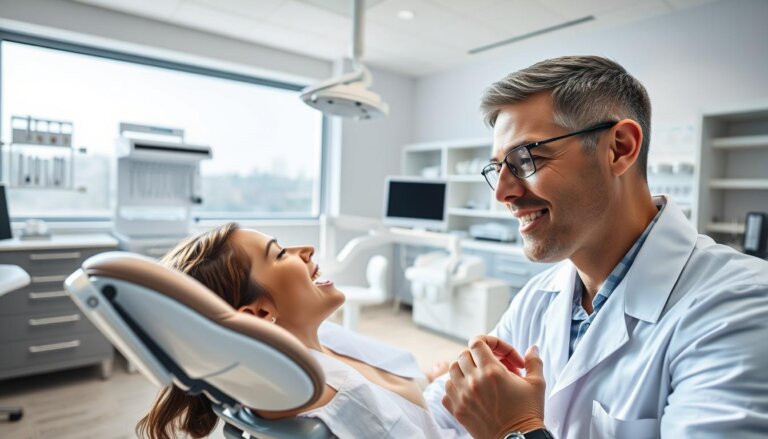Dental Cleaning Without Exam: Is It Possible?
Many people each year ask if they can get a dental cleaning without exam. They want to make their dental visits quicker and cheaper. But, having both cleaning and exams together is very important. Cleaning removes plaque and tartar. Exams check for cavities and other issues. This combined process is not just a formality. It’s key to taking care of your teeth and preventing future problems.
Some wonder, “Can I get just a cleaning, no exam?” While it might be possible, dental experts strongly advise against it. There are legal, ethical, and health reasons why both are done together. Choosing a dental checkup without cleaning may seem faster. However, it could result in missing out on preventing big dental problems in the future. These problems could end up costing you a lot.
Insurance usually covers both exams and cleanings twice a year. This is because both are important for preventing dental issues. If you skip exams and only get cleanings, your oral health could suffer. It could also lead to spending more money on fixing problems that could have been caught early.
Key Takeaways
- Professional dental practices often require exams with cleanings due to health, legal, and ethical considerations.
- Skipping exams could mean missing critical early signs of oral health issues, potentially leading to more severe problems and higher costs.
- Customized care during dental cleanings is based on findings from a preceding exam.
- Most insurance plans endorse the combined approach of exams and cleanings by covering both as part of their preventive care benefits.
- The question “can I only get a cleaning without an exam” raises important discussions on the value of integrated dental care.
Understanding Dental Cleanings
Dental cleanings are key for keeping your mouth healthy. They focus on removing plaque and tartar, which are bad for your gums and teeth. Knowing what goes on during these cleanings shows their value. They do more than make your teeth look good.
- Removal of plaque and tartar: Special tools remove buildup that brushing and flossing miss.
- Polishing of teeth: After removing buildup, polishing gets rid of surface stains and smooths enamel. This helps keep teeth clean longer.
- Gum health assessment: Checking gums regularly finds gum disease early, which lets you treat it before it gets worse.
Regular dental cleanings do a lot for your health, not just your smile. They stop oral diseases and help keep your whole body healthy.
What Is a Dental Cleaning?
A dental cleaning targets mouth hygiene. Dental hygienists often do this job. They use mirrors and scalers to see and clean all tooth surfaces well. This thorough cleaning prevents cavities and gingivitis by reaching every spot.
Importance of Regular Cleanings
Regular cleanings are crucial. They keep your mouth healthy and prevent bigger health problems. Oral health is linked to the rest of your body, affecting heart disease and stroke risks. During these cleanings, dentists can spot and fix small issues before they turn into big ones.
The Importance of Dental Exams
Dental exams are very important. They help keep your mouth clean and healthy. They are key in finding problems early, preventing bigger issues.
In a dental exam, the focus isn’t just on cleaning your teeth. The dentist checks your whole mouth. This is to spot any problems like cavities or gum disease early.
What Happens During a Dental Exam?
A dental exam is quite thorough. It includes checking your teeth and gums. The dentist will look for plaque and tartar build-up. They also measure the gaps between your teeth and gums to check for gum disease. X-rays might be done to see things that aren’t visible to the eye.
Why Exams Are Often Required
Dentists require exams before cleaning. They give valuable info about your oral health. This helps in choosing the right cleaning methods or treatments.
Regular exams can catch problems like gum disease or hidden cavities. Detecting these issues early can prevent more serious health problems. They help create a treatment plan for lasting dental health.
Also, regular check-ups help keep track of your oral health. This allows for quick action if any issues are found.
Can You Get a Cleaning Without an Exam?
In the dental world, many wonder if they can get a cleaning without a dental exam. This question comes up a lot, especially in certain situations. The answer changes based on the state’s rules and different situations.
Sometimes, you might get a cleaning without an exam in special cases. For instance:
- If there’s an emergency that requires immediate cleaning, the full exam can wait.
- Young people with simple dental needs and low risk might not need an exam first.
- Long-time patients who had a recent exam with no new problems might also skip it.
The rules on this vary a lot because of state regulations on dental practices. Some places insist on an exam before cleaning to ensure safety and the best care. Others let dentists decide based on their experience and the patient’s dental history.
It’s important to know why exams and cleanings are different. Exams find hidden problems, but cleanings remove plaque to stop tooth decay and gum disease.
To sum up, cleanings without an exam are sometimes okay, but it depends on the rules and the dentist’s opinion. Always talk to your dental provider to know what’s best for your teeth.
The Benefits of Having an Exam Before Cleaning
Knowing the benefits of dental exams is key for good oral health. These exams are essential in preventive care. They catch potential issues early, preventing them from getting worse. This makes dental cleanings safer and more effective.
Understanding the importance of a comprehensive oral health assessment is first. These aren’t just regular check-ups. They give dentists a complete picture of your dental health. They use visual checks and modern tools to find and manage any problems quickly.
Comprehensive Oral Health Assessment
The first step at the dentist is a detailed exam. It’s vital for planning your treatment. The exam looks for decay, gum disease, and screens for oral cancers. This lets dentists make care plans that meet your unique needs, based on a deep understanding of your oral health.
Customized Treatment Plans
After a detailed exam, dentists can make personalized treatment plans. These are important, especially if you have oral health issues that could affect cleaning. For example, fixing weak or decayed teeth before cleaning prevents damage. This keeps you safe and comfortable.
| Benefits of Dental Exams | Impact on Cleaning Procedure |
|---|---|
| Early detection of cavities | Prevents potential discomfort during cleaning |
| Identification of gum disease | Allows for gentler, more targeted cleaning techniques |
| Evaluation of existing dental work | Adjustments can be made to cleaning methods to avoid damage |
To sum up, having a thorough dental exam before cleaning is about more than prevention. It leads to a safer, more tailored cleaning experience. Cleaning methods can be adjusted for each person’s needs. This approach ensures the best health outcomes and comfort for patients.
Alternatives to Traditional Cleanings
Nowadays, those looking for ways to keep their teeth clean outside the dentist’s office have many choices. There’s a big focus on alternatives to dental cleaning and at-home dental care. This is because of new professional cleaning devices that people can use at home.
At-Home Care Options
You don’t always need to go to the dentist to keep your mouth healthy. Many ways to care for your teeth at home can help stop plaque and tartar. Brushing well twice a day, flossing, and using mouthwash are key actions. Also, trying oil pulling and herbal rinses is becoming popular because they are natural and easy.
Professional Cleaning Devices
For a more detailed cleaning like what you’d get at the dentist, there are special devices for home use. These include ultrasonic toothbrushes and water flossers. They clean deeply between teeth and under the gums, where regular brushing might miss.
However, it’s important to understand that these tools should add to, not replace, visits to the dentist for exams and professional cleanings. A combined approach offers complete care that covers all parts of oral hygiene.
| Device Type | Description | Benefits |
|---|---|---|
| Ultrasonic Toothbrush | Uses sonic wave technology to clean. | Efficient plaque removal, reduces gingivitis |
| Water Flosser | Utilizes a stream of pulsating water to clean. | Effective in cleaning between teeth and below the gumline |
| Air Flosser | Uses a stream of air and micro-droplets to remove plaque. | Gentle on the gums, easy to use |
Exam-Only Visits: Is It an Option?
When looking into dental care, you’ll find many ways to approach it based on what you need. One method is an exam-only visit. It’s perfect for those wanting a detailed check-up without a cleaning right after. This option suits those trying to save money or who just had a cleaning but want to check their oral health again.
The main goal of an exam-only visit is to look at the oral cavity’s condition. It aims to find any new or worsening dental issues and make plans for future treatments. Such visits highlight the benefits of dental exams, like getting a deep understanding of your oral health and finding problems early.
Often, dental insurance plans cover these visits, making them a budget-friendly way to keep an eye on your oral health. By using your insurance smartly, you can save money and still keep your teeth in check. This shows how choosing insurance coverage for exams is a smart move for saving on dental care.
- Reasons for Choosing an Exam-Only Visit
- Financial savings by postponing non-urgent cleanings
- Focus on diagnosing potential oral health issues early
- Adjustment of ongoing treatment plans based on recent health changes
- Potential Costs and Insurance Coverage
- Routine exams typically covered by insurance
- Lower immediate costs compared to combined cleaning and exam visits
- Option to spread out dental expenses over time by separating services
In summary, choosing an exam before cleaning can be a smart move for your health and budget. By picking an exam-only visit, you can take good care of your dental health without spending a lot. It shows how caring for your teeth and saving money can go hand in hand.
Oral Health: The Connection Between Cleaning and Exams
Regular dental check-ups and cleanings are very important. They are key parts of preventive dental care. They link closely to help keep your long-term oral health in good shape. The link between cleanings and exams is crucial for stopping dental problems early. This prevents the need for more complex treatments later.
To make it clear how integrated care helps, let’s look at the benefits:
Preventive Care Overview
Dentists say that combining cleanings and exams is essential for good mouth health. Cleanings get rid of plaque and tartar, stopping gum disease. Exams spot possible issues early. This way, you can avoid more serious problems and keep your overall health in check.
Long-Term Benefits of Combined Care
Your teeth and gums stay healthy for longer with regular preventive care. Regular cleanings and exams mean a total care approach. It not only keeps your mouth healthy but also stops future issues. This method makes sure you have great dental health for a long time.
Let’s compare people who get regular care to those who don’t:
| Health Indicator | Regular Cleaning & Exam | Infrequent Care |
|---|---|---|
| Gum Health | Excellent | Poor |
| Risk of Decay | Low | High |
| Long-Term Oral Health | Very Good | Compromised |
| Overall Healthcare Costs | Lower | Higher |
This analysis shows why regular preventive care is crucial. It not only improves your oral health but also lowers healthcare costs. It’s important to know how crucial cleaning and exams are for keeping up your dental health and wellbeing.
Patient Perspectives: Experiences with Cleanings and Exams
Understanding how patients feel about dental care is very important. It helps make dental practices better and more caring. Many people worry about needing to go for exams and cleanings often. Their worries come from past experiences and what dentists tell them.
Listening to what patients have to say is very important. It shows the good things that come from regular cleanings and exams. Testimonials from patients allow others to learn about the process. This knowledge can make them less worried and more trusting of dental work.
Common Concerns About Visits
Many patients are worried about the discomfort and the time it takes for a full dental visit. They wonder why they need exams if they are just there for a cleaning. Telling them about the benefits of preventing problems early on can make them less scared.
Testimonials from Patients
“My initial reluctance about combined exams and cleanings was quickly overshadowed by the thoroughness of the care I received. Understanding why each part of the process matters really changed my perspective and has kept my dental health on track.” – A patient’s testimony
Stories from patients highlight the value of getting a full dental check-up. They help new patients know what to expect and feel less worried about their own visits.
### Table of Patient Feedback on Dental Experiences
| Patient Feedback | Impact on Future Care Decisions |
|---|---|
| Positive experiences with combined cleanings and exams | More likely to adhere to recommended dental visits |
| Negative experiences with separate procedures | Higher hesitation and irregular visits |
| Neutral feelings but acknowledges necessity | Ambivalent yet complies with professional advice |
Looking at patient feedback shows how important honesty, teaching, and caring are. These things help deal with common worries and boost patient happiness.
The Role of Dental Hygienists
Dental hygienists play a key part in delivering effective dental care. They handle dental hygiene responsibilities with great skill. Their knowledge is crucial for the well-being of patients.
Dental hygienists do more than just clean teeth. They check gum health, look for oral diseases, and offer advice on good oral care. This makes them key players in preventive dental care.
| Responsibility | Description | Impact on Patient Care |
|---|---|---|
| Examination of Gum Health | Inspecting gums for signs of disease | Early detection and management of conditions like gingivitis |
| Plaque and Tartar Removal | Using specialized tools to clean hard-to-reach areas | Prevention of cavities and periodontal disease |
| Patient Education | Providing guidance on brushing, flossing, and nutritional advice | Empowering patients for better at-home care |
Dental experts, especially hygienists, are trained well to use special tools for removing tartar and plaque. If not cleaned, these can cause serious dental problems. Their expertise in treating fragile parts of the mouth is vital for dental health.
Hygienists understand how to work with patients and manage care routines. They are essential to the dental team and focus on preventing dental issues. Truly, their work is critical, showing their importance in dental practices.
Cost Factors: Cleaning vs. Exam
Understanding the financial aspect of oral health is key. Dental cleanings and exams are important but cost differently. This is because of things like service complexity and where you live.
Many dental insurance plans help cover a lot of these costs. This support encourages people to get preventive care. It lessens how much they pay out-of-pocket.
| Procedure | Average Cost without Insurance | Average Cost with Insurance |
|---|---|---|
| Dental Cleaning | $75 – $200 | $0 – $50 |
| Dental Exam | $50 – $150 | $0 – $40 |
The table shows what you might pay for dental exams and cleanings. With insurance, these costs drop a lot. Insurance makes a big difference in how much you spend.
Many dental places have payment plans too. These plans help with costs now and in the future. They let you get cleanings and exams more often without paying more.
Knowing about these costs helps you choose wisely for your dental care. It leads to better oral health and smarter spending.
Finding the Right Dental Provider
Choosing the right selecting a dental provider is very important. It greatly affects your dental health experience. Patients should know what makes a great dental service stand out.
Knowing what makes a great dental office is crucial. A top-notch dental office offers complete care, focuses on teaching patients, and communicates clearly about treatments. This approach ensures patients get treatment and learn about oral health.
Prioritizing these qualities helps in preparing for dental visits and ensures a supportive dental care experience.
- Comprehensive Care: Find clinics that offer many dental services. This shows they can tackle different dental problems.
- Patient Education: Pick a provider that teaches patients about oral health. It shows their commitment to your long-term dental care.
- Transparent Communication: It’s key for trust. It ensures you know what treatments you need and why.
Before visiting a new dentist, think about asking some key questions:
- What types of continuing education or certification do your dental practitioners pursue?
- Can you provide examples of how patient education is a part of your practice?
- What is your approach to preventative dentistry?
Asking these questions helps you pick a selecting a dental provider that meets your medical needs. It should also meet your care and communication expectations.
Keeping Your Oral Health in Check
Keeping your mouth healthy is an ongoing effort. It needs regular habits and timely visits to the dentist. It’s about daily care and knowing when professional help is needed. Let’s dive into some important oral hygiene practices and when to see a dentist.
Tips for Maintaining Healthy Teeth Between Visits
- Brush twice a day with a fluoride toothpaste and a soft-bristled brush.
- Floss daily to remove plaque from areas your brush can’t reach.
- Use an antiseptic mouthwash to help kill bacteria that cause plaque.
- Limit sugary snacks and drinks which can lead to tooth decay.
- Avoid smoking, which can stain teeth and damage gums.
Signs You Need to Schedule an Appointment
Sometimes, ongoing problems can point to bigger issues with your teeth or gums. It’s key to know when to see a dentist to stop further problems and keep your teeth healthy. Look out for these signs:
- Persistent bad breath that doesn’t improve with regular brushing and mouthwash.
- Sensitivity to hot and cold, which might indicate tooth decay or gum disease.
- Gums that are red, swollen, or bleed easily, potential signs of gingivitis or periodontitis.
- Discomfort or pain in teeth or gums can signify various issues including cavities.
- Any changes in the fit of your dental appliances, as this can impact the health of your oral cavity.
Seeing a dentist soon when these issues pop up can stop bigger health problems. It helps keep your oral hygiene at its best.
| Sign | Possible Underlying Issue | Recommended Action |
|---|---|---|
| Persistent bad breath | Bacterial build-up or Gum Disease | Schedule a cleaning or comprehensive exam |
| Tooth sensitivity | Possible enamel wear or decay | Consult dentist for possible treatments |
| Red, swollen gums | Gingivitis or Periodontitis | Immediate dental evaluation |
| Pain in teeth or gums | Cavities, Abscess, or Infection | Urgent dental care required |
| Change in the fit of dental appliances | Changes in gum or bone structure | Consultation for adjustment or new fitting |
Conclusion: Making the Best Choice for Dental Care
Keeping your smile bright starts with smart dental choices. Dental cleanings and exams work together like a team. Experts say you shouldn’t skip an exam before a cleaning. This advice helps keep your teeth healthy.
Weighing Your Options
When picking dental treatments, think about what you need now and later. A dental exam can spot early problems before they get big. This can save money and keep you from needing more treatments later. Think about the benefits and insurance when choosing.
Recommendations for Optimal Oral Health
To keep your mouth healthy, get regular cleanings and exams. They take care of visible issues and hidden ones. This keeps your teeth in top shape. We hope you’ll work with dentists for the best care, using all you’ve learned here.

